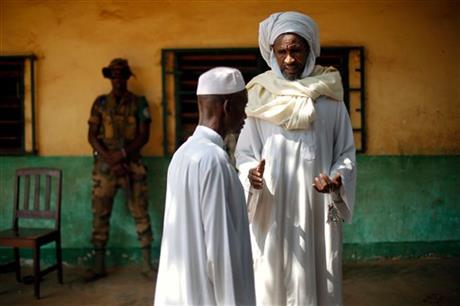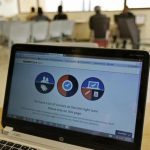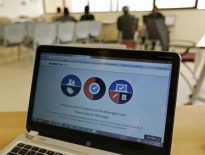BANGUI, Central African Republic (AP) — The U.S. ambassador to the United Nations arrived Thursday in Central African Republic in the highest profile American effort to date to quell the cycle of violence in this impoverished country that has claimed hundreds of lives and displaced at least 10 percent of the population.

Samantha Powers said on the eve of her visit she and President Barack Obama were “deeply disturbed” by the killings by rival militias since the government was overthrown in March.
“The violence has been vicious and primarily directed toward civilians and is increasingly sectarian,” she told reporters in a conference call. “Obviously urgent action is required to save lives.”
Powers landed within sight of a refugee camp of 40,000 people and sped off in a convoy of three armored SUVs guarded by U.S contractors in trucks. Powers will meet with religious and community leaders as well as with President Michel Djotodia, whose forces are accused of taking part in the atrocities.
While Powers, who has been a vocal proponent of U.S. intervention to stop mass atrocities, cautioned against comparing Central African Republic to other African tragedies she didn’t hesitate to draw parallels.
“Somalia showed us what can happen in a failed state and Rwanda showed us what can occur in a deeply divided nation,” she said. “The population of the Central Africa Republic is in danger.”
Before joining government service, Powers wrote a Pulitzer-prize winning book in 2002 about how various U.S. administrations over the years have been reluctant to confront mass atrocities and genocide around the world.
Muslim rebels overthrew the government of Central African Republic in March and a cycle of atrocities and revenge attacks followed, peaking over the last few days with hundreds killed around the country.
Human Rights Watch said in a report Thursday said Christian militias, including soldiers of the deposed regime, responding to “rampant abuses” by Muslim armed groups have killed hundreds around the country, sparking further retaliatory attacks.
According to Powers, some 400,000 people, almost 10 percent of the population had been displaced from their homes in what was already one of Africa’s poorest countries.
A French military force of 1,600 backed by 3,500 troops from African countries have intervened in the country with U.S. logistical support in effort to stop the killings that had left bodies rotting in the streets of the capital Bangui.
Human Rights Watch’s U.N. director Phillipe Bolopion said Powers’ early work on genocide make her a significant choice for the first high-level U.S. mission.
“She used to be an observer on the sidelines and now she is at the very center of it so she’s fully aware of what is at stake there and with her background I think she is doing everything in her power to push the U.S. government to react the way it should,” he said.
Bolopion called for a U.N. peacekeeping mission of at least 9,000 soldiers.
A senior U.S. official, speaking on condition of anonymity, said part of Powers’ mission would be to assess the necessity of such a mission.





